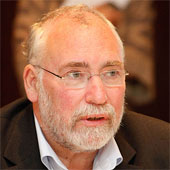The World at War — Thinking the Unthinkable
Should the world be concerned that it is in a state of global war?
March 13, 2003
In both previous world wars, Europe was the main battlefield. However, in WWIII Europe finds itself on the periphery.
Yes, European political leaders may be engaged in the policy debate. But with the possible exception of an outburst of terrorism, most of Western and Central Europe will not experience any fighting. And this time around, it can be ruled out for certain that there will be any fighting between European states.
The legacy of two world wars as well as the modern demographics of Europe render it unsuitable terrain for war. Beyond that, however, nothing is certain. Whether the war will have an impact on the planned extension of EU membership remains to be seen. The EU itself — at least its "core" — is likely to survive the war.
But history should have taught us that nothing should be taken for granted. While blood is unlikely to be spilled on a large scale in Europe, the ramifications of the war will in all likelihood be substantial and unexpected.
In most of the rest of the world, including Southeast and East Europe, the prevailing situation falls into one of two categories. Either it is one of actual war — for example, in Chechnya, Israel/Palestine, large chunks of sub-Saharan Africa and in Sri Lanka.
Or, where there is no outright war, the landscape is marred by deep-seated tensions and instabilities. These tensions come with pronounced fault lines, either within borders or across borders — or both.
Some of the more smoldering volcanoes include: the Korean peninsula, India and Pakistan (across and within borders) — as well as the Andes (also across and within borders).
In addition, there is Central Asia — which is arguably the cauldron of the world. It is situated at the crossroads between expansionist and generally unstable states and ideologies. And lastly, there is most of the Middle East and most of Africa.
And even in those areas where there is no actual war — that is, no fighting — it is in most cases difficult to talk of a state of peace. In some of the areas not mentioned so far, there is likely to be a very high state of insecurity.
Take Latin America. While the Andes region is a flashpoint, life in Argentina is increasingly difficult and dangerous. If the economy goes south in Brazil, the expectations that have arisen by the election of Luis Inacio (Lula) da Silva could be transformed into a period violent acrimony.
Even in Southeast Asia, long considered a placid area, none of the countries — apart from Singapore — can be described as stable, let alone robust.
Greater China may be the apple of the foreign investor's eye. But it can be described as lacking in serious fault lines only with difficulty. And so it goes for most of the planet.
Among the most critical questions will be the impact of the war on the United States. In both the previous world wars, the United States was engaged. But, with the exception of the bombing of Pearl Harbor, world wars never involved its own territory. September 11 has changed that dramatically.
This raises another big difference. In WWI and WWII, hostilities were between states and their alliances. The Third World War does, of course, include and involve states, but also principally involves non-state actors — even though some may be supported and financed by states, namely terrorists.
In 1917-1918 and in 1941-1945, the citizens of, say, Milwaukee — as in the rest of the United States — did not need feel any greater insecurity than possibly having a son or husband called up to war duty. Milwaukee itself would not be bombed.
In this war, Milwaukee might very well be bombed or Nashville or Des Moines or Tucson — not by Saddam, but by al Qaeda or some variant thereof. Unlike the two previous world wars, therefore, the United States is now both at war — and in war.
The ramifications are difficult to assess. One key question for both the world and the United States itself refers to its openness.
The great strength of the United States has been what Harvard professor Joseph Nye has termed its "soft power", namely the country's great ability to attract talents.
However, with the United States becoming increasingly insecure within its own borders, there is already a trend to pulling up the drawbridges. If this trend were to be sustained, the repercussions both for the United States and the world could be quite tremendous.
The global geopolitical landscape conjures up a quite Orwellian vision. This is the image of the world at war with itself. Not, as in its previous incarnations, composed of great alliances between states confronting each other on battlefields, on land, air — or sea. Rather, it is a world in a state of anarchic and violent decomposition.
Will the situation improve? Will these quite terrible last few years eventually be seen as a nightmarish hiatus prior to the restoration of a dynamic, robust and peaceful and increasingly prosperous global order? It could, but only if we act. "Things" do not just happen.
People make things happen — or not, as the case may be. The drift to Orwellian global anarchy can be reversed. In fact, it must be.
Human nature is by inclination optimistic, hoping for the best, averse to hearing the worst. That led us to a false conclusion — assuming that disasters don't really happen, do they? Well, they do.
While we learn to cope with this new phenomenon, I follow one simple rule of thumb. It is better to be alarmist and be proved wrong, than to be complacent — and be proved wrong.
Read previous
Germany — Drifting No More
March 12, 2003
